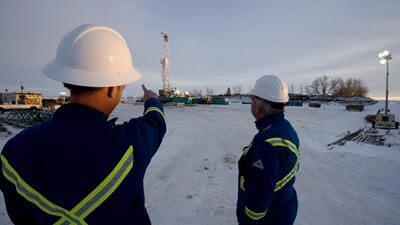Taqa reported a fall in first-quarter earnings, as questions remain about the fate of the company’s troubled North American assets.
The company, whose full name is Abu Dhabi National Energy Company, said that revenue in the period fell sharply, to just over Dh5 billion from Dh7.3bn a year earlier, mainly owing to much lower oil and gas prices this year.
Taqa reported net income of Dh256m, down from Dh271m a year earlier.
It was kept in the black by a Dh553m tax credit because of a change in tax law in the UK in March. Without that windfall it would have reported a Dh254m loss.
The company’s executives, in a brief call for investment analysts, highlighted improvements in Taqa’s operational performance. But they warned that regular maintenance at oil and gasfields would mean that over the next two quarters there would be a seasonal downturn in output.
The sharp reductions in investment the company has made in the past two years would also lead to declining volumes down the road.
“The effect of the lower commodity pricing environment has been seen in our financial performance, which has been significantly affected,” said Ed LaFehr, Taqa’s chief operating officer.
He said that output remained near record levels in the quarter – at an average of 157,900 barrels of oil equivalent per day – but normal seasonal maintenance would mean a decline in output levels in the next two quarters before bouncing back at the end of the year.
Mr LaFehr, who took over day-to-day running of the company after the former chief executive Carl Sheldon left early last year, said: “We do know that natural production decline will catch up with us and over time, as we’ve reduced our capital expenditures, we will see quarter-on-quarter declines in output if the current environment remains the way it is with respect to investment.”
Taqa cut its capital expenditure by 30 per cent last year and has said it will reduce it by a further 39 per cent this year, to about US$1bn.
Some of the lower spending is due to power projects in Morocco and Ghana no longer requiring development spending, said Martin Kohlhase, an analyst at Moody’s Investors Service.
But Mr LaFehr was clear that the company’s investment levels would lead to an inevitable decline in production eventually.
Last month, Taqa reported a loss for the year of about Dh3bn as it wrote down the value of its oil and gas assets, mainly in its troubled North American portfolio. That came on top of a Dh2.5bn loss the year before.
Last year’s loss would have been bigger if Taqa had given all of its North American assets a “fair value”, according to its auditor, EY.
The accounting firm noted in Taqa’s accounts that a “third party affiliate” – that is another company with a relationship to Taqa, which the company declines to name – had agreed to purchase Taqa’s North American assets for Dh20.2bn, compared to an estimated market valuation of about Dh13.6bn.
In other words, without that deal, Taqa would have had to write down the value of its North American assets by about another Dh6.6bn, deepening last year’s loss substantially.
Taqa executives declined to comment on the purchase agreement.
“Our comments are limited to what has already been disclosed in our 2014 annual report,” a company spokesman said.
Taqa said that it had not made any significant asset divestments in the past 12 months, which indicates that the North American assets deal is structured so as to allow Taqa to carry the assets on its books even though the third party as agreed to pay an above-market price at some stage.
Taqa is majority owned by Abu Dhabi Water and Electricity Authority, with other government shareholders bringing the total owned by Abu Dhabi to about 76 per cent. The remaining shares are publicly held by about 100,000 shareholders, all UAE-based, according to Taqa.
amcauley@thenational.ae
Follow The National's Business section on Twitter

